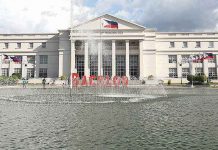BORACAY – Indigenous people (IP) will soon get their share of agricultural land in this famed island resort, according to Department of Agrarian Reform (DAR) secretary John Castriciones.
Castriciones reiterated on Monday that the IPs are the priority beneficiaries of the land reform program in Boracay, saying that DAR “expects distributing land to the agrarian reform beneficiaries (ARBs) this year.”
The agrarian reform process in the island had started rolling, including the screening of qualified IPs, he added.
The screening is set to be completed this year.
Castriciones said the agricultural lands with no existing structures built on them will be first distributed.
These areas, measuring a total of close to 26 hectares, are for immediate agrarian reform coverage, Castriciones stressed.
They are part of the 628.96 hectares of land classified as agricultural under Presidential Proclamation 1064 series of 2006.
Boracay’s IPs are the government’s priority beneficiaries so they can own and cultivate land for their food and livelihood, Castriciones stressed.
“Farmers are the hope and true heroes of our country, as they provide food and help strengthen our economy,” he said, emphasizing the importance of agrarian reform.
According to DAR, the patches of agricultural land for distribution to qualified IPs in Boracay are in the villages of Yapak (14.66 hectares), Balabag (1.01 hectares), and Manoc-manoc (10.10 hectares).
The soil in these areas is suitable for growing crops, DAR undersecretary David Erro earlier said.
Erro said some 80 Atis in the island have been identified as potential ARBs.
The primary ARB selection criteria under the Comprehensive Agrarian Reform Law of 1988 are that candidates must be least 15 years old, willing to cultivate land, and are landless.
DAR is celebrating this week the 30th year of the law and its offshoot, the Comprehensive Agrarian Reform Program (CARP).
“Agrarian reform means redistribution of lands, regardless of crops or fruits produced, to farmers and regular farm workers who are landless, irrespective of tenurial arrangement, to include the totality of factors and support services designed to lift the economic status of the beneficiaries and all other arrangements alternative to the physical redistribution of lands, such as production or profit-sharing, labor administration, and the distribution of shares of stocks, which will allow beneficiaries to receive a just share of the fruits of the lands they work,” the law states.
CARP is a government initiative of granting agricultural land ownership to landless farmers and farm workers nationwide.
As of December 2017, DAR has reported distributing a total of 4.86 million hectares of land nationwide, benefitting 2.84 million ARBs. (With a report from PNA/PN)



